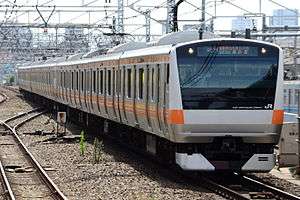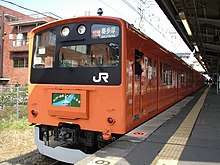Holiday Rapid Okutama
 E233-0 series EMU on a Holiday Rapid Okutama & Akigawa service, July 2011 | |
| Overview | |
|---|---|
| Service type | Special Rapid |
| Status | In service |
| Locale | Tokyo, Japan |
| First service | July 1971 |
| Current operator(s) | East Japan Railway Company (JR East) |
| Former operator(s) | Japanese National Railways |
| Route | |
| Start | Shinjuku / Tokyo |
| End | Okutama / Musashi-Itsukaichi |
| Line(s) used | Chūō Main Line, Ōme Line, Itsukaichi Line |
| On-board services | |
| Class(es) | Standard class only |
| Seating arrangements | Longitudinal |
| Catering facilities | None |
| Other facilities | No toilets |
| Technical | |
| Rolling stock | E233-0 series EMUs |
| Track gauge | 1,067 mm (3 ft 6 in) |
| Electrification | 1,500 V DC overhead |
| Operating speed | Maximum 110 km/h (68 mph) |
The Holiday Rapid Okutama (ホリデー快速おくたま) is a Holiday Rapid service train operated by East Japan Railway Company from Shinjuku / Tokyo (Eastbound only) to Okutama on the Chūō Main Line (Chūō Line (Rapid) and the Ōme Line.
Additionally, this article will also mention the related Holiday Rapid Akigawa (ホリデー快速あきがわ) train from Shinjuku / Tokyo (Eastbound only) to Musashi-Itsukaichi on the Chūō Main Line (Chūō Line (Rapid), the Ōme Line, and the Itsukaichi Line.
Service pattern
From October 1990, the service is included in the variety of Holiday Rapids, and starts operation during the holidays as a temporary service, denoted as the Holiday Rapid Okutama・Akigawa (ホリデー快速おくたま・あきがわ) . Afterwards, from 1st December 2001 onwards, the service is upgraded to a regular service, operating on the weekends and holidays.
On weekends and holidays, 3 trains would operate each day. From Shinjuku to Haijima, the Okutama and the Akigawa would be coupled and run together.
- Westbound trains depart Shinjuku, and decouple at Haijima. The Okutama would continue on the Ōme Line to Okutama, and the Akigawa would head on to the Itsukaichi Line to Musashi-Itsukaichi.
- Eastbound trains depart Okutama (Okutama) and Musashi-Itsukaichi (Akigawa) separately, and couple at Haijima, then head towards Tokyo.
Stations served
Holiday Rapid Okutama
(Tokyo ← Kanda ← Ochanomizu ← Yotsuya ← ) Shinjuku - Nakano - Mitaka - Kokubunji - Tachikawa - Nishi-Tachikawa - Haijima - Fussa - Ōme - Mitake - Okutama
- Stations listed in brackets are only served by eastbound services only.
- Additionally, the service would stop at extra stops where events are held.
- Yokota Air Base Japanese-American Friendship Festival: Ushihama Station
- Hamura Flower and Water Festival (Tulip Festival): Hamura Station
- Ōme Marathon, Shiofune Kannonji Azalea Festival: Kabe Station
- Yoshino Baigo Plum Festival: Hinatawada Station
Holiday Rapid Akigawa
(Tokyo ← (Coupled with the Okutama) ← ) Shinjuku - (Coupled with the Okutama) - Haijima - Kumagawa - Higashi-Akiru - Akigawa - Musashi-Hikida - Musashi-Masuko - Musashi-Itsukaichi
- The service stops at all stations within the Itsukaichi Line (Haijima - Musashi-Itsukaichi).
- From Tokyo / Shinjuku - Haijima, the service is coupled with the Okutama, hence the stations served are the same.
Timetable
The timetable will only list departure time (unless noted) at major stations, namely Tokyo, Shinjuku, Mitaka, Tachikawa, Haijima, Ōme, Okutama and Musashi-Itsukaichi.
| Station | ↓ Westbound ↓ | ↑ Eastbound ↑ | ||||||||||
|---|---|---|---|---|---|---|---|---|---|---|---|---|
| Okutama | Akigawa | Okutama | Akigawa | |||||||||
| No. 1 | No. 3 | No. 5 | No. 1 | No. 3 | No. 5 | No. 2 | No. 4 | No. 6 | No. 2 | No. 4 | No. 6 | |
| Tokyo | / | 17:11 | 18:03 | 18:36 | (Coupled with the Okutama) | |||||||
| Shinjuku | 06:46 | 07:44 | 08:19 | (Coupled with the Okutama) | 16:58 | 17:50 | 18:22 | |||||
| Mitaka | 06:59 | 07:58 | 08:33 | 16:44 | 17:35 | 18:09 | ||||||
| Tachikawa | 07:15 | 08:11 | 08:47 | 16:32 | 17:22 | 17:56 | ||||||
| Haijima | 07:31 | 08:27 | 09:04 | 07:29 | 08:25 | 09:01 | 16:19 | 17:13 | 17:46 | 16:16 Arrival | 17:11 Arrival | 17:44 Arrival |
| Ōme | 07:49 | 08:44 | 09:20 | / | 15:55 | 16:52 | 17:25 | / | ||||
| Okutama | 08:21 | 09:17 | 09:54 | 15:27 | 16:18 | 16:54 | ||||||
| Musashi-Itsukaichi | / | 07:55 | 08:48 | 09:21 | / | 15:55 | 16:48 | 17:21 | ||||
Rolling stock

Current
- E233-0 series 6+4 car EMUs
- Decoupling / coupling operations takes place at Haijima Station. East of Haijima, 10-car trains would be operated; West of Haijima, 6-car trains would operate for the Okutama, and 4-car trains would operate for the Akigawa.
Past
- 201 series 6+4 car EMUs
Future development
With green cars entering service on the Chūō Line, Ōme Line in 2020, it has not been announced if the Okutama and Akigawa services would be changed or cancelled as a result of this.
References
This article incorporates material from the corresponding article in the Japanese Wikipedia.
.svg.png)